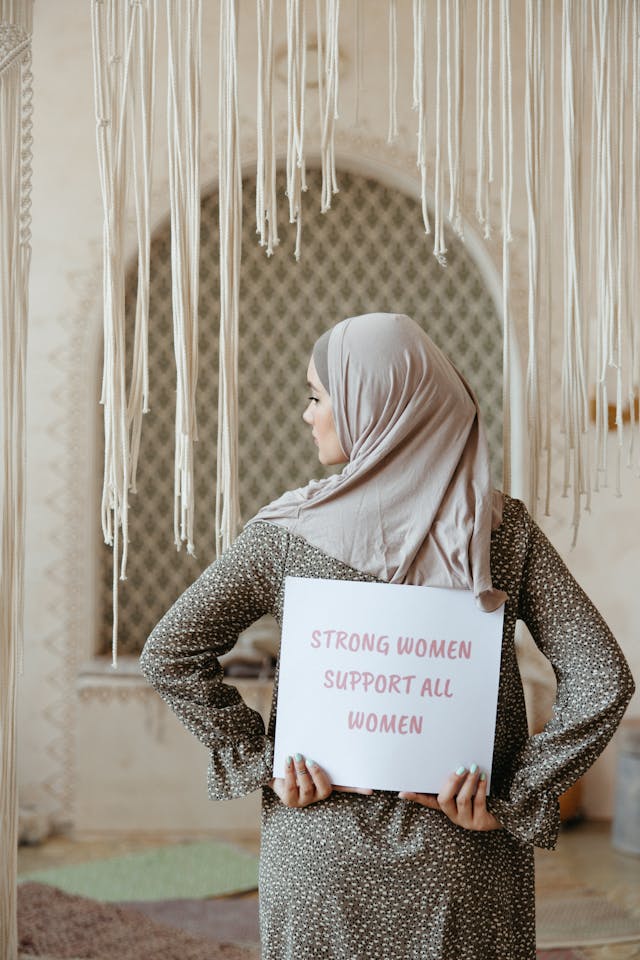Across the globe, women persistently encounter obstacles and systemic discrimination, especially in professional and public domains. Addressing these challenges is imperative; it necessitates coordinated efforts, effective policies, and a commitment from organizations such as Islamic Relief USA (IRUSA).
However, the situation is fraught with complexities and many barriers still exist. Although there are initiatives in place, the pace of change is often hindered by various factors. This underscores the importance of sustained advocacy because without it, true equality may remain elusive.
Barriers to Gender Equality
Women in every part of the world face gender-based discrimination, which significantly constrains their access to various opportunities. This inequality is entrenched in cultural attitudes, legal systems, and economic frameworks. Some of the most urgent challenges include:
- Workplace Discrimination—Across all nations, women encounter bias in hiring processes, persistent wage gaps, and occupational segregation. Interestingly, only 67 countries have instituted laws that explicitly prohibit gender discrimination in hiring practices. In 2019, for every dollar that men earned, women earned merely 51 cents—this stark income disparity is alarming.
- Legal Restrictions—Legal restrictions pose another barrier: Among 173 economies, a staggering 155 impose at least one legal limitation on women’s employment and entrepreneurial endeavors. These restrictions often encompass constraints on property ownership, access to credit, and participation in specific professions. Although sexual harassment laws are present in 114 economies, the enforcement of these laws is insufficient and victims frequently find themselves without access to justice. However, change is essential to address these systemic issues.
- Social Norms and Cultural Practices—Harmful customs (such as child marriage and female genital mutilation) continue to endure, inhibiting women and girls from realizing their full potential. One in five young women globally marry before the age of 18, which reinforces cycles of poverty and restricts opportunities.
- Unpaid Care Work—Women disproportionately shoulder the burden of unpaid care work, often spending an average of 2.3 additional hours per day on household responsibilities compared to men. This imbalance hinders their ability to pursue education, employment, and personal development.
- Access to Education and Healthcare—By 2030, it is estimated that 110 million girls may still be out of school, while maternal mortality rates stagnate in numerous regions because of inadequate healthcare infrastructure and a shortage of skilled medical professionals. Without targeted interventions, progress toward equal access to education and healthcare will remain insufficient.
- Violence Against Women and Girls—Each year, intimate partners perpetrate physical and/or sexual violence against more than 245 million women and girls. Gender-based violence exacerbates inequalities and undermines women’s capacity to engage fully in society.
- Economic Inequality and Poverty—It is projected that by 2030, more than 340 million women and girls (who are affected by extreme poverty) will be forced to subsist on less than $2.15 per day. To disrupt this cycle, women must have access to economic opportunities and stable, dependable employment.
- Inadequate Funding—Attaining gender equality necessitates an extra $360 billion each year. However, merely 4% of bilateral aid is designated for gender equality initiatives, indicating a significant funding shortfall.
- Global Efforts Toward Gender Equality—The 2030 Agenda for Sustainable Development serves as a comprehensive framework for tackling these pressing challenges. SDG 5 (which emphasizes gender equality) underscores critical areas for intervention—such as enhancing women’s representation in leadership positions, eradicating violence against women, and guaranteeing access to education and healthcare. Progress is being made; however, with only seven years remaining to achieve these objectives, accelerated action is essential.
The Role of Organizations in Advancing Women’s Rights
Organizations are instrumental in dismantling barriers to gender equality. IRUSA represents one such entity committed to empowering women through various initiatives.
- Sustainable Livelihoods—IRUSA assists orphaned, widowed, and female-headed households in Nepal and Pakistan, thereby enabling women to attain financial independence and stability.
- Women Entrepreneurs—In Afghanistan, IRUSA focuses on women entrepreneurs by equipping them with resources and training to launch successful businesses in provinces like Balkh, Herat, and Bamyan.
- Healthcare and Microfinance—In Mali and Niger, IRUSA provides access to essential healthcare services and Islamic microfinance opportunities. This initiative enables women to escape the relentless cycle of poverty and enhances their ability to support their families.
- Small Business Opportunities—In Somalia, IRUSA plays a crucial role in facilitating socio-economic empowerment, assisting women in establishing small businesses and emerging as leaders within their communities.
By prioritizing education, healthcare, and economic empowerment, IRUSA’s programs cultivate sustainable avenues for women to improve their lives and contribute significantly to their societies. Donations to IRUSA directly bolster these important initiatives, which are designed to dismantle barriers and promote equality for women globally. For further details about the vital work IRUSA is undertaking to empower and uplift women worldwide, visit https://irusa.org/womens-programs/.
A Call to Action
Achieving gender equality necessitates active intervention from governments, organizations, and individuals alike. Legal reforms ought to confront discrimination, uphold existing protections, and guarantee equal rights regarding property, education, and employment. Governments must increase their investments in gender equality initiatives. However, the private sector should also implement equity and inclusion policies within their workplaces. Although individual efforts to challenge harmful norms and support women’s empowerment can create a ripple effect throughout communities, men must also participate in the active promotion of gender equality. This includes sharing household responsibilities and addressing gender-based violence. The obstacles obstructing gender equality will only diminish through relentless efforts and dedicated resources. As we approach 2030, every step forward—no matter how small—brings us closer to a future where gender equality is a reality rather than merely a goal.

Leave a Reply